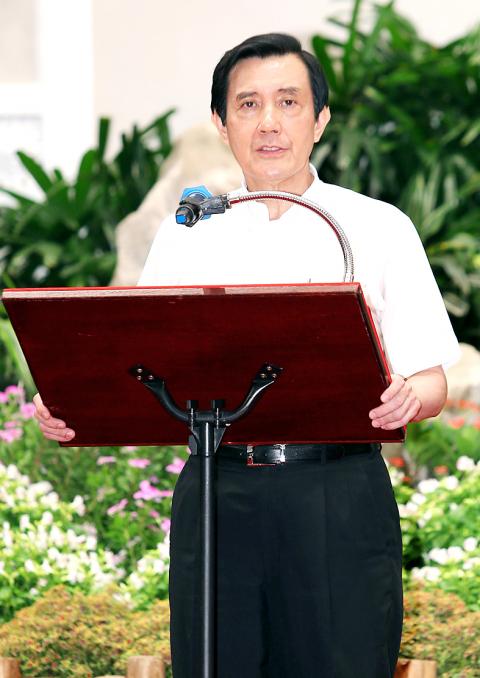President Ma Ying-jeou (馬英九) yesterday threw his support behind beleaguered Mainland Affairs Council Minister Wang Yu-chi (王郁琦), while likening his former deputy minister, Chang Hsien-yao (張顯耀), to a “pest” in cross-strait ties.
Legislators across party lines have called on Wang to step down for his “ham-fisted” handling of Chang’s case, who has been accused of leaking state secrets and forced to resign.
The president yesterday voiced his approval of Wang’s actions, saying: “There is no need for him to resign.”

Photo: CNA
“It was Wang who took the initiative to investigate Chang after [being tipped off about a possible information leak]. He made decisions swiftly and cooperated with prosecutors,” Ma said.
“He also held a press conference that lasted for 70 minutes. It is pretty rare for a government, with respect to this kind of events, to spend so much time explaining,” the president said.
Stressing the importance of cross-strait relations, the president compared it to a tree that has to be nurtured, while implying that Chang was a pest that could ruin the relationship.
“For a sapling to grow, you need a gardener to water and fertilize it, and when pests are found, the gardener has to get rid of them,” he said.
“The development of cross-strait relations cannot be allowed to stall because of a pest, and we cannot ignore it [the pest] once it has been found,” Ma said, adding that Chang’s case would not affect progress in cross-strait exchanges.
Responding to Democratic Progressive Party Chairperson Tsai Ing-wen’s (蔡英文) call for him to apologize and for national security officials to be held accountable, Ma said that Tsai was “confused about [the issue] and reversing the procedure.”
“As Chang is only suspected [of leaking information] rather than having been convicted, we need to adhere to the principle of presumption of innocence,” Ma said. “It is strange to ask for someone’s apology or demand that they admit to certain mistakes when the result has not yet been determined.”
Ma denied that the case involves any political infighting within the administration.
“How could we target him, our own colleague? However, if he committed a crime, we cannot conceal it either,” he said.
When asked about the prospect of a meeting with Chinese President Xi Jinping (習近平) following this incident, Ma said his positive attitude toward the meeting, if certain preconditions are met, has not changed.
“As for [Chang’s] case, I think in the end it will be clear to everybody that it has nothing to do with the Ma-Xi meeting,” he said.
Responding to Ma’s statement, DPP spokesman Huang Di-ying (黃帝穎) said it showed a “lack of self-reflection.”
“Apologizing for [his administration’s handling of] Chang’s case is the president’s political responsibility, whereas the principle of presumption of innocence is a notion of legal responsibility. Ma conflated the two and used the latter as a political pretext for refusing to apologize,” Huang said. “This amounts to ignorance of democratic constitutionalism.”
Moreover, comparing Chang to a pest, based on the president’s political logic of presumption of innocence, “would then constitute deliberate humiliation,” Huang said.
“The absurdity of Ma’s logic is eye-opening,” he said.

CHAOS: Iranians took to the streets playing celebratory music after reports of Khamenei’s death on Saturday, while mourners also gathered in Tehran yesterday Iranian Supreme Leader Ayatollah Ali Khamenei was killed in a major attack on Iran launched by Israel and the US, throwing the future of the Islamic republic into doubt and raising the risk of regional instability. Iranian state television and the state-run IRNA news agency announced the 86-year-old’s death early yesterday. US President Donald Trump said it gave Iranians their “greatest chance” to “take back” their country. The announcements came after a joint US and Israeli aerial bombardment that targeted Iranian military and governmental sites. Trump said the “heavy and pinpoint bombing” would continue through the week or as long

TRUST: The KMT said it respected the US’ timing and considerations, and hoped it would continue to honor its commitments to helping Taiwan bolster its defenses and deterrence US President Donald Trump is delaying a multibillion-dollar arms sale to Taiwan to ensure his visit to Beijing is successful, a New York Times report said. The weapons sales package has stalled in the US Department of State, the report said, citing US officials it did not identify. The White House has told agencies not to push forward ahead of Trump’s meeting with Chinese President Xi Jinping (習近平), it said. The two last month held a phone call to discuss trade and geopolitical flashpoints ahead of the summit. Xi raised the Taiwan issue and urged the US to handle arms sales to

State-run CPC Corp, Taiwan (CPC, 台灣中油) yesterday said that it had confirmed on Saturday night with its liquefied natural gas (LNG) and crude oil suppliers that shipments are proceeding as scheduled and that domestic supplies remain unaffected. The CPC yesterday announced the gasoline and diesel prices will rise by NT$0.2 and NT$0.4 per liter, respectively, starting Monday, citing Middle East tensions and blizzards in the eastern United States. CPC also iterated it has been reducing the proportion of crude oil imports from the Middle East and diversifying its supply sources in the past few years in response to geopolitical risks, expanding

Pro-democracy media tycoon Jimmy Lai’s (黎智英) fraud conviction and prison sentence were yesterday overturned by a Hong Kong court, in a surprise legal decision that comes soon after Lai was jailed for 20 years on a separate national security charge. Judges Jeremy Poon (潘兆初), Anthea Pang (彭寶琴) and Derek Pang (彭偉昌) said in the judgement that they allowed the appeal from Lai, and another defendant in the case, to proceed, as a lower court judge had “erred.” “The Court of Appeal gave them leave to appeal against their conviction, allowed their appeals, quashed the convictions and set aside the sentences,” the judges